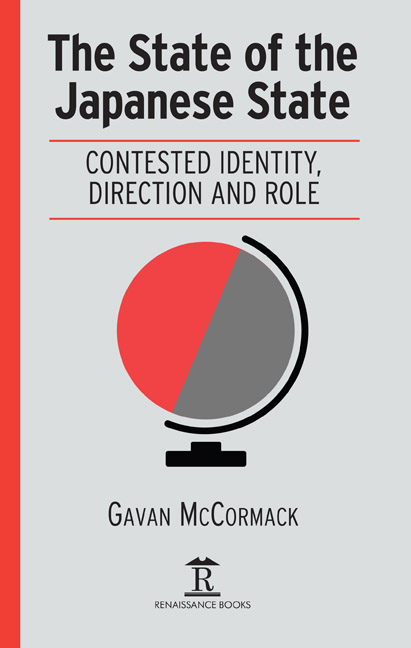Book contents
- Frontmatter
- Contents
- Preface
- Chapter 1 The Improbable Package
- Chapter 2 The Client State
- Chapter 3 The Client State’s Client State
- Chapter 4 Okinawa – State Violence and Civic Resistance
- Chapter 5 Around the East [China] Sea
- Chapter 6 The Construction State
- Chapter 7 The Constitutional State
- Chapter 8 The Rampant State
- Chapter 9 Conclusion
- Afterword
- Index
- Frontmatter
- Contents
- Preface
- Chapter 1 The Improbable Package
- Chapter 2 The Client State
- Chapter 3 The Client State’s Client State
- Chapter 4 Okinawa – State Violence and Civic Resistance
- Chapter 5 Around the East [China] Sea
- Chapter 6 The Construction State
- Chapter 7 The Constitutional State
- Chapter 8 The Rampant State
- Chapter 9 Conclusion
- Afterword
- Index
Summary
EVEN AS THIS study of the Japanese state moved to publication, there were signs that both the state and the international system that envelops it might be on the brink of large changes. A few final comments are called for.
At multiple international forums Prime Minister Abe insists that Japan is a country that stands on the universal values of human rights and democracy and the rule of law, but I have stressed that the Japanese state is deeply conflicted. Virtually all members of the Abe government belong to an organization, Nihon Kaigi, whose reactionary blend of neo-conservatism, neo-nationalism, and historical revisionism would likely be proscribed in any other contemporary democratic state, and underpinning all state policies is the principle of faithful service to a country that is chronically war-prone and recognizes submission to no law. The humiliation for Japan bred of servility (to the United States) is compensated by the assertion of emperor-centered uniqueness and superiority, likewise at odds with the assumption of universal values.
The ability of the Abe state to carry its agenda forward faces two key challenges, diplomatic and domestic. The first concerns North Korea but has implications much broader than simply the Korean peninsula. In diplomatic terms Abe's insistence that there could be no room for negotiation with North Korea was rebuffed early in 2018 by the other major state parties with a stake in the peninsula crisis, giving way, even in Washington, to a readiness to do deals, and to a Korea-centered view, orchestrated especially by the South Korean president, Moon Jae-in. Suddenly, early in 2018, one could sense the possibility of something unimaginable a year earlier: a Korean peace, rooted in a negotiated settlement, de-nuclearized and subject to multilateral security guarantees. To the extent that the Cold War knots around the Korean peninsula might be untied by such initiatives, foreign troop occupations, in Japan as well as Korea, ie, the 100,000 that Joseph Nye insisted in 1995 (above, pp. 50-51) had to be maintained in East Asia, could be withdrawn, opening the door upon a post-San Francisco Treaty, post-Cold War, even perhaps post-US hegemony, regional order. It would, in that event, signal also the end of clientelism.
- Type
- Chapter
- Information
- The State of the Japanese StateContested Identity, Direction and Role, pp. 241 - 248Publisher: Amsterdam University PressPrint publication year: 2018



